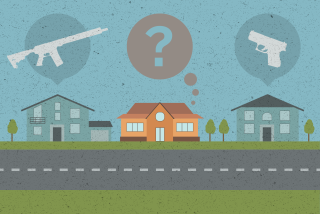For Gun Control, Give Big Cities Local Control : Crime: Outrage about the urban homicide rate should be channeled into winning the power to regulate firearms.
Homicide statistics tell us that Los Angeles has an important independent interest in regulating the commerce in lethal weapons. In the typical year of 1993, this city of 3.6 million reported 1,076 killings, more deaths than 46 of the 50 states. About 70% of the homicides here are caused by guns, the great majority of them handguns.
What can Los Angeles do to regulate the millions of guns out on the streets? Absolutely nothing. The California Supreme Court ruled more than a decade ago that the Legislature had preempted the field of firearms control, leaving local governments without any authority to make rules about the ownership and transfer of guns. All that the City Council members can do when the death toll climbs is wring their hands and blame Sacramento and Washington.
From a political standpoint, there is much to be said for being powerless to act on a subject as controversial as gun control, where both taking action and failing to take action can make an elected representative unpopular. But there are two problems with rendering city government impotent on this matter.
The first problem is that the city cannot seriously address an epidemic of violent killings when it lacks power to regulate guns. Telling the police that removing guns from the streets should be a special priority is of some help, but it is also frustrating for police when ample supplies of replacement guns are freely available.
The second problem is that the Legislature is unlikely to respond to big-city carnage by making statewide restrictions on handguns. The Legislature is the level of government least likely to support tough gun control because of the large influence of suburban and rural groups. The National Rifle Assn. has recognized this in recent years and redirected its efforts to the state level.
The most Los Angeles can try to get from Sacramento in the 1990s is the opportunity to make its own policy for its own citizens through passage of home-rule powers for major cities.
Effective power at the city level would require two changes in state law. First, the Legislature must grant explicit power to cities with more than 500,000 residents to regulate ownership and transfer of handguns. What state law had preempted in the matter of gun control, it can un-preempt in a straightforward manner.
The second change to make home rule enforceable is legislation requiring gun dealers to ensure that the people who purchase handguns from them are entitled to own such guns in the city where they live. Since federal law already requires dealers to check the identification of all prospective buyers, this would not be a great burden. Without such a law, dealers could open up shop on the outskirts of big cities. This second step, giving cities the same respect that state law has had since 1968, would remove the most important defect in most home-rule systems.
Passing a home-rule gun-control package in Sacramento will be anything but easy. But home rule is the best chance for any meaningful control in California because it leaves the non-urban population untouched by new regulations. To oppose home rule is also rather awkward for legislators who ordinarily put great emphasis on the interests of states and localities in controlling crime.
A consistent emphasis on home-rule powers in political campaigns and legislative hearings would produce more discomfort for the enemies of gun control in California than any other option. It might also empower city leadership to supplement rhetoric with action.
More to Read
Sign up for Essential California
The most important California stories and recommendations in your inbox every morning.
You may occasionally receive promotional content from the Los Angeles Times.










